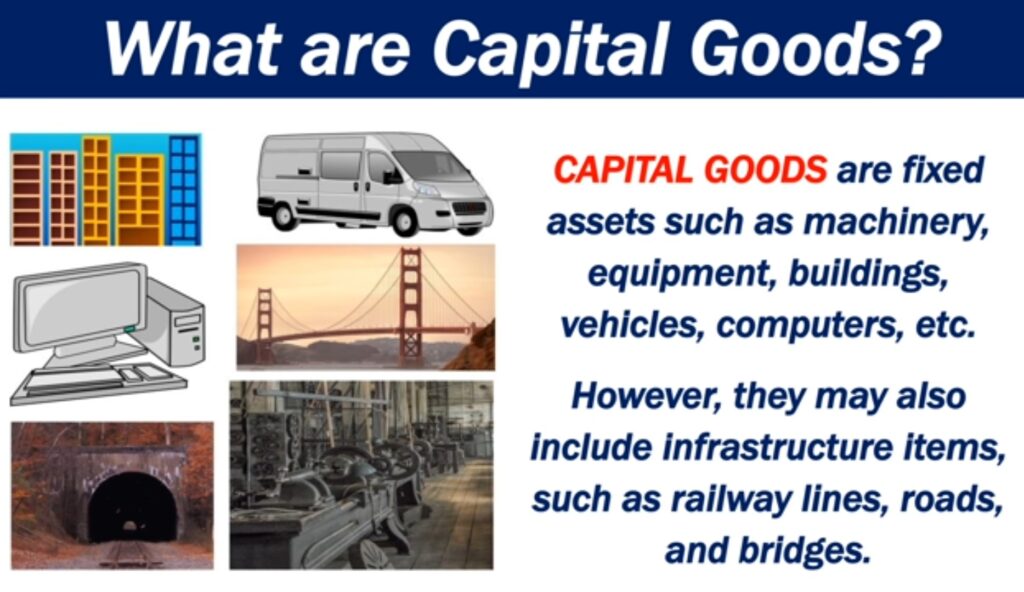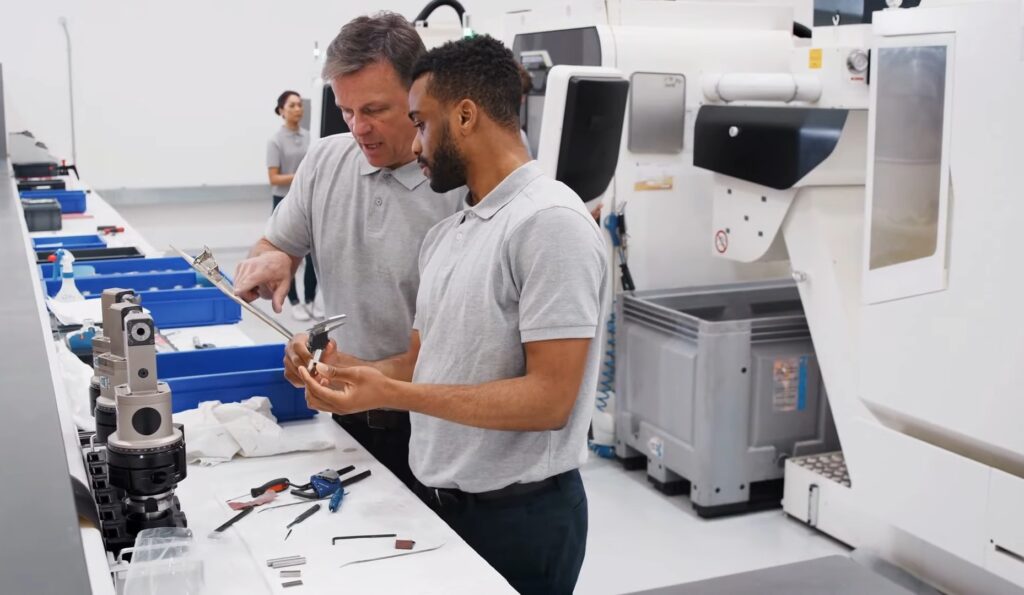Is Capital Goods a Good Career Path
If you’re considering a career in capital goods, you may be wondering if it’s worth the investment of time and effort. This article will explore the pros and cons of a career in capital goods, as well as the skills, education, and industries that are involved. There are also some tips on how to land a job and what challenges you might face.
Why Capital Goods?
Capital goods are tangible assets that are used to produce other goods and services. They are essential to many industries and play a significant role in economic growth. Capital goods can range from machines, tools, and buildings to software and patents. A career in capital goods can provide job satisfaction, financial stability, and growth opportunities.
What is Capital Goods?
Capital goods are goods that are used to produce other goods or services. They are essential to the production process and can include physical and non-physical assets such as machinery, equipment, buildings, and patents. Capital goods are an important aspect of many industries and have a significant impact on economic growth.

Pros of a Career in Capital Goods
There are many benefits to a career in capital goods, including:
- Lucrative Salaries: Capital goods professionals are typically well-compensated, with salaries that can range from $50,000 to $200,000 or more depending on experience and location. As technology advances, there is a growing demand for experienced professionals in this field.
- Job Security: Capital goods are essential to many industries, which means that there will always be a demand for professionals in this field. In times of economic uncertainty, capital goods professionals can feel secure in their jobs.
- Opportunity for Career Advancement: Due to the important role that capital goods play in the economy, there are many opportunities for career advancement in this field. Professionals who demonstrate their expertise and skills can advance to management positions or other high-level roles.
- Chance to Work on Cutting-Edge Technology: Capital goods professionals work on the latest and most advanced technology in their field, which can be exciting and rewarding. They are at the forefront of innovation that can drive important changes in different industries.
Cons of a Career in Capital Goods
Along with the benefits comes some drawbacks to a career in capital goods, including:
- Often Involves Long Hours: Capital goods professionals may be required to work long hours, especially when working on complex projects. This can result in a poor work-life balance.
- Can be Stressful: Working in capital goods can be stressful, particularly when dealing with strict deadlines, complex designs, or harsh conditions.
- High Pressure Environment: Capital goods professionals work in high-pressure environments where mistakes or delays can have severe consequences. This can result in high stress levels and a need for attention to detail.
- May Require Continuous Learning to Stay Up-to-Date: Technology advancements can make most knowledge irrelevant within a short time. Thus, it’s important for capital goods professionals to continually learn and stay up-to-date on the latest trends, technology advancements to be at the top of their game.
Education and Training Required for a Career in Capital Goods
To embark on a successful career in the capital goods industry, acquiring the appropriate education and training is essential. While specific requirements may vary depending on the job role and specialization, there are some general educational pathways and training programs that can prepare individuals for a career in this field.
1. Academic Education
Most positions in the capital goods industry require a minimum of a bachelor’s degree in engineering or a related field. The following disciplines are commonly pursued:
- Mechanical Engineering: This field focuses on the design, development, and maintenance of machinery and equipment. It provides a strong foundation for various roles within the capital goods industry.
- Electrical Engineering: Electrical engineers specialize in the design and implementation of electrical systems, which are integral to many capital goods.
- Industrial Engineering: Industrial engineering combines principles of engineering and management to optimize processes and enhance efficiency in manufacturing and production.
2. Vocational or Technical Training:
In addition to formal education, vocational or technical training programs can provide hands-on experience and practical skills specific to certain job roles within the capital goods industry. These programs may cover topics such as machinery operation, equipment maintenance, and safety protocols.
3. Internships and Apprenticeships:
Gaining practical experience through internships or apprenticeship programs can be invaluable for starting a career in the capital goods industry. These opportunities allow individuals to work alongside experienced professionals, apply theoretical knowledge to real-world scenarios, and develop industry-specific skills.
5. Continuous Learning:
The capital goods industry is constantly evolving, driven by technological advancements and changing market demands. Therefore, professionals in this field should embrace lifelong learning. Staying updated with emerging technologies, industry trends, and best practices through self-study, online courses, or specialized training programs can contribute to long-term career growth.
It’s important to note that while education and training provide a solid foundation, practical experience and the ability to apply knowledge in real-world scenarios are equally important in the capital goods industry. Therefore, individuals should actively seek opportunities to gain hands-on experience, collaborate with industry professionals, and develop a comprehensive understanding of the capital goods landscape.
Types of Jobs in Capital Goods
The capital goods industry offers a wide range of job opportunities, each contributing to the design, production, maintenance, and distribution of capital goods. These jobs require diverse skill sets and expertise. Let’s explore some of the key roles within the capital goods industry:
1. Mechanical Engineer: Mechanical engineers play a crucial role in the capital goods industry. They are responsible for designing, developing, and maintaining machinery and equipment. They apply engineering principles to ensure the efficiency, reliability, and safety of capital goods.
2. Electrical Engineer: Electrical engineers specialize in the electrical systems and components of capital goods. They design and integrate electrical systems, circuits, and controls. Their expertise is essential in areas such as automation, robotics, and electrical power distribution.
3. Industrial Designer: Industrial designers focus on the aesthetics, functionality, and user experience of capital goods. They combine artistic creativity and engineering principles to create innovative and visually appealing designs. Industrial designers consider factors such as ergonomics, materials, and manufacturing processes to optimize the form and function of capital goods.
Related Topics:
s Transportation A Good Career Path
Is Industrial Machinery/Components a Good Career Path
Is Metal Fabrication a Good Career Path
Is Miscellaneous a Good Career Path
Is Public Utilities A Good Career Path
Is Major Banks a Good Career Path
4. Project Manager: Project managers oversee the planning, execution, and successful completion of capital goods projects. They coordinate resources, manage budgets and timelines, and ensure that projects meet the desired objectives. Effective project management is crucial for delivering capital goods within specified deadlines and budget constraints.
5. Sales and Marketing Professional: Sales and marketing professionals play a vital role in promoting and selling capital goods. They identify potential clients, build relationships, and communicate the value propositions of various products. Sales and marketing professionals are responsible for market research, developing sales strategies, and achieving revenue targets.
6. Service Technician: Service technicians provide maintenance, repair, and troubleshooting support for capital goods.

Industries that Require Capital Goods Professionals
Since there are so many various businesses that use capital goods, the capital goods industry is very large. Among the most popular industries are:
Automotive: Workers in the capital goods sector of the automotive sector design, develop, and produce automobiles, trucks, buses, and other types of vehicles. Additionally, they assemble automobiles and inspect them for quality on the assembly line.
Construction: Capital goods specialists work in the construction sector to plan, develop, and maintain infrastructure such as buildings, roads, bridges, and other structures. They also do duties at the construction site, running large equipment and putting together buildings.
Farm equipment: Designers, developers, and manufacturers of tractors, harvesters, and other agricultural gear make up the farm equipment industry. They also operate and maintain farm machinery as part of their daily employment.
Aviation: Workers in the capital goods sector of the aviation sector design, create, and produce aircraft, helicopters, and other types of aircraft. Additionally, they assemble aircraft and evaluate them for quality on the assembly line.
packaged Foods: Designed, developed, and manufactured by capital goods specialists working in the packaged foods sector, these machines create and package food products. They also operate and maintain the equipment at the food manufacturing facility.
These are just a handful of the various sectors that need expertise in capital goods. There are numerous chances for people with the necessary qualifications and expertise in the capital goods sector, which is one that is expanding.

Future Trends in Capital Goods Industry
The capital goods industry is rapidly evolving with advancements in technology. Here are some emerging trends likely to impact the industry:
The Impact of Emerging Technologies
Emerging technologies such as AI, machine learning, and IoT are gradually being introduced into the industry. Professionals that are active in the industry and keeping abreast of these developments stand a much better chance to excel in their field.
Opportunities in Renewable Energy
There is a growing demand for energy-efficient capital goods like solar panels and wind turbines in an effort to reduce the carbon footprints. This presents an opportunity for professionals to specialize in renewable energy.
The Trend Towards Automation
Automation-of-capital-goods is increasing in the industry to improve efficiency. Professionals can take advantage of this opportunity by learning and applying different automation technologies.
Salaries in the Capital Goods Industry
The precise job title, location, and amount of experience all affect how much an employee makes in the capital goods sector. However, incomes in this sector are generally above average.
Engineers in the United States make an average yearly pay of $91,730, according to the Bureau of Labour Statistics (BLS). Machinists make an average of $48,370 per year, while assemblers make an average of $31,320.
Naturally, they are simply median wages. Depending on the individual job title, region, and experience level, salaries might vary greatly. For instance, a mechanical engineer with 10 years of expertise in the auto sector might anticipate to make a lot more money than a machinist with only two years of experience in the building trade.
Here is a table of some of the average salaries for different job titles in the capital goods industry:
| Job Title | Average Salary |
|---|---|
| Mechanical Engineer | $91,730 |
| Electrical Engineer | $96,720 |
| Software Engineer | $100,140 |
| Machinist | $48,370 |
| Assembler | $31,320 |
| Quality Control Inspector | $35,730 |
| Sales Representative | $53,810 |
You can see that wages in the capital goods sector are typically higher than the national average. This is due to the increasing demand for the knowledge and experience needed for these positions. You might anticipate making a nice wage if you are interested in a career in the capital goods sector.
It’s also critical to remember that salaries in the capital goods sector can vary by location. Salaries in metropolitan areas are typically greater than those in rural areas. Furthermore, compensation can differ according to the particular industry. As an illustration, wages in the automobile sector are often greater than wages in the construction sector.
Job Outlook for Capital Goods Professionals
The job outlook for capital goods professionals is promising. Technological advancements, the demand for efficiency and sustainability, global infrastructure development, the replacement of aging capital assets, global economic expansion, and the retirement of experienced professionals contribute to the industry’s growth. These factors create abundant opportunities for skilled individuals in various roles within the capital goods industry.
Career Paths and Growth Opportunities in Capital Goods
As mentioned, there are many opportunities for career advancement in the capital goods industry. Here are several routes:
- The possibility of Switching Industries: Capital goods professionals have transferable skills that can be applied to many industries, increasing the likelihood of identifying job opportunities outside of the industry.
- Climbing the Ladder Within the Industry: There’s plenty of room for growth within the industry by expanding your skills and experience. Opportunities include management or directorship positions.
- Becoming an Entrepreneur: Capital goods professionals who are interested in starting their own companies can benefit from the skills and knowledge acquired in the field.
How to Land a Job in Capital Goods
Finding a job in capital goods requires some job-seeking skills. Here are some tips to increase your chances:
- Finding Job Opportunities: Networking, job boards, and online job portals are excellent ways of finding job opportunities in capital goods.
- Improving Your Resume and Application: Your resume should be tailored to the position, emphasizing specific skills or areas of expertise that align with the job description.
- Preparing for the Interview: Prepare for the interview by researching the company, rehearsing common interview questions, and developing your own questions.
Companies Hiring Capital Goods Professionals
Some top companies that hire capital goods professionals include Cummins Inc., Caterpillar, and General Electric. These companies tend to hire individuals with technical skills, industry experience, and leadership potential.

May You also Like: 11 COMPANIES OFFERING HIGHLY PAID REMOTE INSURANCE JOBS 🚀
Challenges and Obstacles to a Career in Capital Goods
There are some potential difficulties that job seekers in capital goods might face, including:
Discrimination and Unequal Opportunities
The capital goods industry has been traditionally male-dominated, which can sometimes lead to discrimination or unequal opportunities.
Difficulty Obtaining Experience
Most job postings require several years of experience. It can, however, be challenging for new graduates to obtain experience in this field.
Attracting and Retaining Diverse Talent
As with other industries, the capital goods industry should strive to attract and retain diverse talent from all backgrounds.
Conclusion
While there are certainly challenges and obstacles in the capital goods industry, there are also significant rewards. Capital goods professions can provide financial stability, career advancement, and the satisfaction of working on complex projects. By considering the pros and cons, exploring different jobs, and investing in your education, you can build a successful career in this industry.
FAQs
What Education Do I Need to Pursue a Career in Capital Goods?
Most jobs in the capital goods industry require either a Bachelor’s or Master’s degree, especially in STEM fields such as mechanical or electrical engineering.
What Industries Require Capital Goods Professionals?
Capital goods are used in virtually every industry, including aerospace and defense, automotive, construction, and energy.
What Are the Highest Paying Jobs in the Industry?
The highest-paying jobs in the industry include project managers, quality control managers, and engineers.
How Can I Improve My Chances of Getting Hired in Capital Goods?
You can improve your chances of getting hired by developing a diverse set of skills, industry knowledge, and experience. Networking and keeping up-to-date with industry trends can also help.





Pingback: Is Miscellaneous a Good Career Path -
Pingback: How Many Jobs Are Available in Basic Industries -
Pingback: Is Life Insurance a Good Career Path -